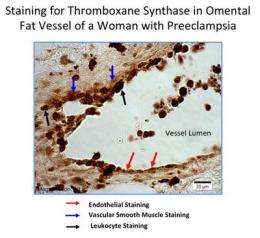Changes in gene expression may help explain high blood pressure in pregnancy

(Medical Xpress) -- Virginia Commonwealth University School of Medicine researchers have discovered that changes in the gene expression of a key enzyme may contribute to high blood pressure and increase susceptibility to forming blood clots in pregnant women with preeclampsia.
These findings could provide clues to the best treatment approaches for high blood pressure and the formation of blood clots that can block blood flow to a pregnant woman’s internal organs and lead to organ failure.
Researchers have been working to determine the root cause of preeclampsia on the molecular level and have now identified that epigenetic mechanisms may be at play. Epigenetics refers to changes in gene expression that are mediated through mechanisms other than changes in the DNA sequence.
In a study published online this week in Hypertension, a journal of the American Heart Association, the VCU team reported that thromboxane synthase – an important inflammatory enzyme – is increased in the blood vessels of expectant mothers with preeclampsia. The thromboxane synthase gene codes for this enzyme, which is involved in several processes including cardiovascular disease and stroke. This enzyme results in the synthesis of thromboxane, which increases blood pressure and causes blood clots.
“The present work is unique because it opens up a new concept as to the cause and subsequent consequences of preeclampsia relating to epigenetics,” said corresponding author Scott W. Walsh, Ph.D., professor in the VCU Department of Obstetrics and Gynecology. “It is the first study to show that epigenetic alterations in the blood vessels of the mother are related to preeclampsia.”
According to Walsh, one of the main epigenetic mechanisms is methylation of the DNA, which controls the expression of genes. The increase of this enzyme in the blood vessels is related to reduced DNA methylation and the infiltration of neutrophils into the blood vessels. Neutrophils are white blood cells that normally help fight infection.
In the future, Walsh said some potential treatments for preeclampsia may include inhibition of thromboxane synthase, blockade of thromboxane receptors or dietary supplementation with folate. He said that folate supplementation could increase methylation donors to protect against adverse changes in DNA methylation that affect expression of the thromboxane synthase enzyme.
This study builds on previously published work by the VCU team that appeared in the November 2011 issue of Hypertension and in the January 2011 issue of the American Journal of Pathology and demonstrated a significant role for neutrophils as causative agents of high blood pressure in preeclampsia.
This work was supported by grants from the National Heart, Lung and Blood Institute and the National Center on Minority Health and Health Disparities
Walsh collaborated with Ahmad A. Mousa, Ph.D., graduate student in the Department of Physiology and Biophysics, and Jerome F. Strauss III, M.D., Ph.D., dean of the VCU School of Medicine.
More information: Read the study here.















